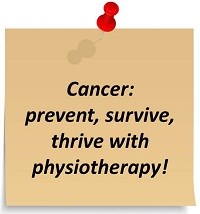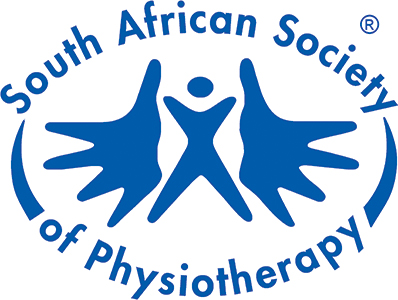
You want one piece of advice about cancer, whether you have it or you want to prevent it?
EXERCISE!
Yup, that’s it.
Get moving.
The top two tips for preventing cancer given by health authorities like the World Health Organisation are: don’t use tobacco, and be physically active. (The third tip is, of course, eat a healthy diet.)
Research into well-studied cancers like breast, colon and lung cancer show that people who engage in regular, moderate-intensity exercise, have a significantly reduced chance of getting these diseases (and this holds true for a number of other cancers, too). And we really mean ‘significant’ risk is reduced by between 20 and 40%.
The questions are: what is ‘regular’, how long should you do it, and what is ‘moderate intensity’?
Moderate intensity activity includes things like walking briskly; dancing; cycling on fairly level terrain; gardening (raking and digging, not delicate pruning!); scrubbing floors and other housework activities like that; playing with children.
The experts vary on what ‘regular’ means. Some say around three or four times a week; others say most days of the week. So aiming for five times a week seems reasonable. The duration should be between 20 and 40 minutes at a stretch; the ideal is to hit 150 minutes or more a week, which would mean 30 minutes five times a week.
Surviving and thriving
So that’s prevention; how about surviving cancer?
When your cancer is diagnosed, you’ll get a lot of practical advice about how to manage life while you’re in treatment.
If there’s a physiotherapist on your oncology team, she or he will give you this vital tip: exercise. Yes, it’s safe to exercise while you’re undergoing cancer treatment, many studies have shown that. But exercising while you’re being treated will do much, much more: it will improve your strength, reduce the fatigue often associated with oncology treatments, and greatly improve your quality of life.
“This is not surprising,” says South African Society of Physiotherapy President Dr Ina Diener. “Exercise has a myriad beneficial effects on the body, from improving blood flow to the brain to improving heart function, so it stands to reason the body will benefit from exercise when it’s facing the challenge of cancer therapy, too.”
It also helps cancer survivors to get back to health after treatment and improves quality of life. “If you’re at all concerned about what kind of exercise you should be doing and if it’s right for you, you should consult your physiotherapist,” says Dr Diener. “Physiotherapists are medically trained experts in creating tailor-made exercise programmes to suit each individual’s needs and specific circumstances.”
And she adds a real kicker: “We’ve got a lot of research that shows people who do regular exercise have a much better survival rate and a reduced chance of recurrence.”
What’s not to like? Movement is good health – so put your takkies on and head for the great outdoors!
Back






